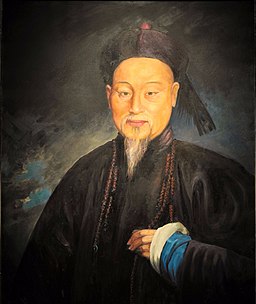But instead of reviewing the review, I shall simply provide a link to it, and let those of you who are interested nip across to read it for yourselves.
Continue & CommentOf Politics and Poo
“Medicinal rhubarb was commercially grown from 1777 in Oxfordshire. It had been valued as a purgative and laxative for many centuries: a bag of rhubarb was considered sufficiently valuable to have been listed in the will of Marco Polo, and in the mid-nineteenth century the Chinese official Lin Zexu, unaware that it was, by then, a familiar feature of the Victorian vegetable garden, threatened Queen Victoria with a complete ban on the export of rhubarb. His intention was to bring a constipated nation to its knees and thus to end British sales of opium in China.”
from The Silk Road: Two Thousand Years in the Heart of Asia by Frances Wood.
Personally, I wish Lin Zexu had been successful in his quest to stop (or possibly stop up) that giant pusher the British Empire and “eliminate this poison once and for all and to the benefit of all mankind.” You can read more of his letter here. It’s powerful stuff, and even today, there are those to whom it could well be posted.
Continue & CommentClassic Pleasures: The Gardening Catalogue
It was Agatha Christie who first introduced me to the gardening catalogue. Being Agatha Christie, she naturally made it a harbinger of sudden and mysterious death (you’ll have to read The Thirteen Problems to find out how).
Of course, gardening catalogues were nothing new in 1932, when the book came out. The first ever was, according to Wikipedia, produced by an Englishman in 1667, back when Charles II was ruling Britain, Louis “l’etat c’est moi” XIV ruling France, and the Mughal emperor Aurangzeb (son of Mumtaz Mahal, as in Taj Mahal) ruling the Indian subcontinent.
Continue & Comment

